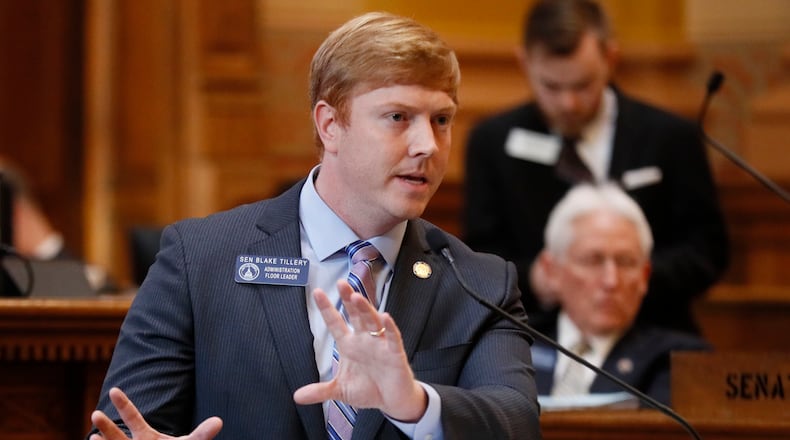The Georgia Senate passed a state budget on a party-line vote Friday that cuts $2.6 billion in spending during the upcoming year.
That means in fiscal 2021 — which begins July 1 — $1 billion less would be sent to local districts to fund k-12 schools. Millions of dollars would also be cut from a host of health care programs, forcing staff furloughs in the agency that for the past three months has been fighting the coronavirus pandemic.
The Senate voted 34-15 to pass the budget, setting up negotiations with the House over a spending plan that must be approved in the next few days. The Republican majority backed the measure while Democrats opposed it, saying the General Assembly should be raising more revenue by increasing the state’s tobacco tax to the national average.
Senate Appropriations Chairman Blake Tillery, R-Vidalia, on Friday gave the chamber a list of areas where proposed cuts were mitigated. For instance, state troopers won't would not have to take days off without pay. He noted that 54% of the state budget would go to education.
“There will be less in this budget, and our priorities here are shown not by adding more but by simply being able to reduce less in certain areas,” he said.
“You don’t reduce funds by 11%, $2.6 billion, without somehow impacting … every corner of this state,” Tillery said.
Democrats said the Republican majority in recent years has cut income tax rates — with most of the benefit going to the wealthy — and underfunded education and health care programs, only to now call for massive spending cuts because of the pandemic recession.
"We are put into a terrible, terrible situation because we've made bad decisions," said Senate Minority Leader Steve Henson, D-Stone Mountain.
“We cannot continue to have policies and decisions based on responding to corporate lobbyists who want tax breaks, and not on the needs of the 4-year-olds and 3-year-olds of our state who want a bright future,” he said.
Sen. Gloria Butler, D-Stone Mountain, said, "I am unable today to support this budget because I cannot stand to see the people of this state go without."
Lawmakers returned to the Capitol on Monday after a three-month hiatus brought on by the coronavirus pandemic. Legislators knew they’d be coming to Atlanta to cut spending dramatically.
The pandemic brought record unemployment, and thousands of businesses either closed or still struggle to remain open. That, in turn, has sent state tax collections — mostly for income and sales taxes — plummeting.
Because lawmakers expect less revenue, they face cutting funding for everything from k-12 schools and universities to the Georgia State Patrol, food safety inspections, highway construction, mental health and substance abuse programs, and county health departments.
Under budget plans that agencies submitted last month, more than 1,000 filled jobs would be eliminated and tens of thousands of state employees would be furloughed.
In the Senate budget, how many days staffers would have to go without pay depends on where they work.
Many agencies show no furlough days. Those who work in some judicial agencies, such as judges and public defenders, may be required to take six furlough days if they earn more than $100,000 a year. Public health workers, who have been fighting the coronavirus pandemic, would have to take 12 furlough days next year.
A department proposal for the State Patrol called for officers to take 24 furlough days next year to meet budget cut targets. But Tillery said senators were able to find savings in other areas to avoid having to make the State Patrol take off almost five weeks without pay.
While basic k-12 funding would be cut, Tillery said the Senate plan increases spending in areas meant to help low-wealth school districts. He also said funding for pre-kindergarten classes would not be cut, in large part because lottery sales — which pay for them — have remained strong during the recession.
The proposal also calls for almost $1 billion in borrowing for construction projects, including $342 million for schools.
A long list of mental health, substance abuse treatment and health care programs would see funding reduced, including programs to train more doctors at the Morehouse School of Medicine and Mercer University’s medical school. County health departments would receive $14 million less next year, public libraries $3.2 million less for materials. The GBI would freeze dozens of positions for investigators, scientists and lab technicians.
Democrats and some Republicans, such as Senate Finance Chairman Chuck Hufstetler of Rome, have called for increasing the tobacco tax to the national average, a move that could bring in about $600 million a year.
Sen. Jen Jordan, D-Atlanta, said the current tax of 37 cents a pack — among the lowest in the nation — brings in $230 million a year, while the state spends $650 million a year treating public health care patients for smoking-related illnesses.
“Georgia taxpayers are paying for the decision of many who make the decision to smoke cigarettes,” Jordan said.
“The words ‘personal responsibility’ are often evoked in this chamber. Raising the cigarette tax is about personal responsibility,” she said. “It should not be for the people of this state to pay for the decisions of others, decisions that we know will lead to tobacco-related diseases.”
The Senate Finance Committee later Friday approved a Republican-backed bill sponsored by Sen. Randy Robertson, R-Cataula, to raise the rate from 37 cents to $1.35 per pack, which is still below the national average of about $1.80.
However, House Speaker David Ralston, R-Blue Ridge, who plays a major role in what bills receive consideration, has rejected a tax increase on cigarettes. He also has opposed a move by the Senate to cut back on some special-interest tax breaks, saying they would force some businesses to lay off more workers if they didn't get the tax breaks in the future.
About the Author
Keep Reading
The Latest
Featured





